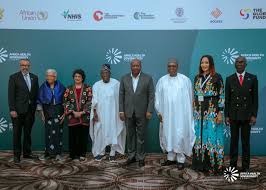President John Mahama has issued a strong challenge to fellow African leaders, urging them to abandon the outdated notion that health spending hampers national economies.
Instead, he advocated for health as a vital investment and the “engine of productivity,” essential for the continent’s inclusive growth.
Speaking at a high-profile Accra Health Sovereignty Summit in Accra, President Mahama called for a fundamental shift away from dependence on donor support for health infrastructure.
He advocated for a “new multilateralism,” grounded in co-creation and mutual respect, rather than extraction or charity.
“The outdated notion that health drains our economies must be rejected,” President Mahama declared in his keynote address. “In truth, health is the engine of productivity and the bedrock of inclusive growth.”
To underscore his point, the President cited World Health Organisation (WHO) research indicating that every $1 invested in health resilience yields up to $4 in returns. He emphasised that this return is even greater in Africa, given its youthful populations and “latent economic dynamism.”
“Every malaria case prevented is a day of work regained. Every maternal death avoided is a family stabilised. Every vaccinated child is a future secured,” he stated, illustrating the tangible economic and social benefits of health investment.
President Mahama, who convened the Accra Meeting, urged economists across the continent to revise national accounts to reflect health as a productivity multiplier rather than a mere consumption expense. He implored Ministers of Finance to treat health as a capital investment.
To achieve this paradigm shift, he outlined a three-pronged strategy:
1. Globally: Championing a new health governance architecture that reflects a multipolar, digitally interconnected, and climate-challenged world.
2. Regionally: Scaling up homegrown solutions.
3. Nationally: Demonstrating the political will to mobilise funds and promote good governance fit for 21st-century realities, moving beyond mere plans.
Success, he observed, would hinge on scaling innovations such as PANABIOS for data health verification and pandemic preparedness, PROPER for transparent medical supply chains, and BIONOVAC to transform vaccine production from molecule to market.
“In Ghana, we have not stood still,” noted. The President announced the “uncapping” of the National Health Insurance Scheme (NHIS) financing, effectively opening up approximately 3.5 billion cedis more in fiscal space for broader and deeper health coverage.
He also referred to the Ghana Medical Trust Fund (MahamaCares), designed to mobilise public, private, and philanthropic capital to tackle chronic disease burdens like hypertension, diabetes, and kidney failure.
The President announced plans to launch a national Primary Healthcare Programme in the coming months, which will come along with the recruitment of community health volunteers. These initiatives, he noted, represent a significant step forward in preventive care, aimed at improving the general health and wellness of citizens.
The high-profile Africa Health Sovereignty Summit attracted a remarkable group of leaders and experts, including former Nigerian President Olusegun Obasanjo, former Liberian President Ellen Johnson Sirleaf, former Mauritius President Dr Ameenah Firdaus Gurib-Fakim, and the Director-General of the WHO, Dr Tedros Adhanom Ghebreyesus.
The summit convened health professionals from across the continent and the diaspora, global experts, non-profit organisations, investors, donors, and students, all committed to advancing health equity and sovereignty in Africa.


Comments are closed.